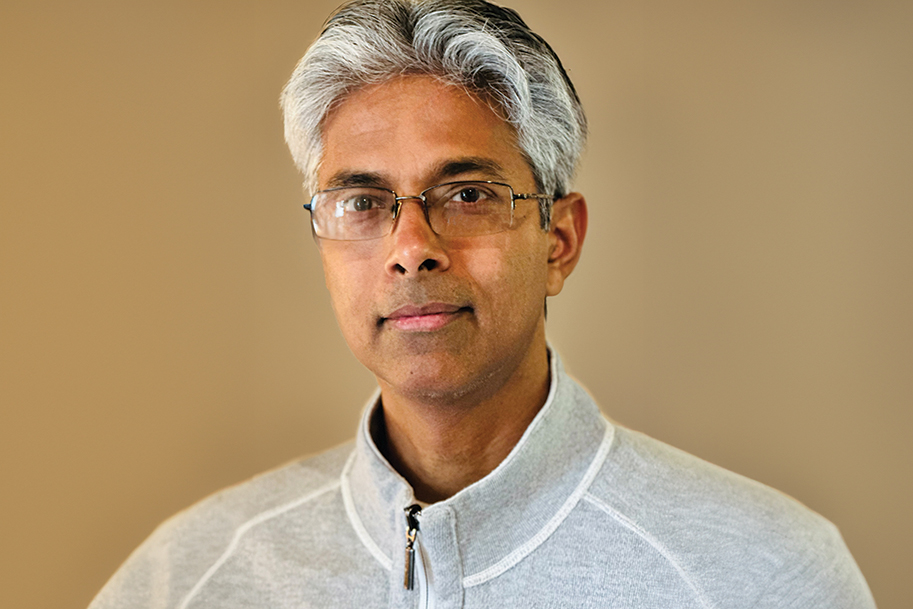Real-World Applications
Computer scientist Piyush Kumar opens doors to career success for graduates in Tallahassee

The first time Piyush Kumar ever laid eyes on a computer, in-person, was as a seventh grader growing up in Bokaro Steel City, India.
“It was displaying a simple graphics screensaver that I still remember,” said Kumar, now an entrepreneur and professor of computer science at Florida State University. “I used to tinker with radios back then, trying to figure out how they worked. That interest shifted to computer gaming and trying to understand how programs were built.”
Kumar threw himself into studying algorithms for computer graphics and went on to earn a bachelor’s in mathematics and computing from the Indian Institute of Technology in Kharagpur before moving to the U.S. to complete a master’s and Ph.D. in computer science at Stony Brook University in New York.
“In graduate school, I was working on machine learning algorithms for large datasets. One of the data libraries I used, Atlas, was written by a Ph.D. student at FSU. I was fortunate enough to meet that student, R. Clint Whaley, when I visited campus. Both in terms of students and colleagues, it was a great place to be, and the climate reminded me of home,” Kumar recalled.
After joining FSU’s faculty in 2004 as an assistant professor, Kumar delved deeper into research applying algorithms to computational geometry, computer graphics, pattern recognition and machine learning problems. In 2011, he launched a consulting firm, CompGeom Inc., in Tallahassee to translate his research into industrial applications. Researchers at CompGeom specialize in hardware and software development for clients ranging from the City of Tallahassee to the U.S. Department of Defense, with an emphasis on robotics and autonomous systems.
“I opened CompGeom because I wanted to work on real-world problems during my sabbatical. The plan was to keep this company open for three months, but it has been 13 years now!” Kumar joked.
Encouraged by CompGeom’s success, Kumar founded a second company, Intelligent Robotics Inc., in 2016, with the goal of carrying out innovative, fundamental, and applied research in artificial intelligence. He also envisioned the company as a vehicle for cultivating a vibrant local research and development community through partnerships with national entities, including the U.S. Air Force, and community outreach events, such as programming workshops at area high schools. Several students from those workshops would go on to secure internships within the company, further developing their skills.
“I have been incredibly lucky to work with some of the best students at FSU. Some of these bright students want to stay in Tallahassee while also working in a cutting-edge field. They are enthusiastic to create an impact in their hometown or chosen home. Fostering this sense of pride and ownership in their work can lead to innovative solutions.”
— Piyush Kumar, Professor of Computer Science
In 2018, Kumar and CompGeom developers identified a gap in the global seismic data market where AI solutions could be applied to map Earth’s subsurface geological features — including faults, fractures and other variations — and process massive datasets for use by geophysical researchers in the oil and gas industry. Kumar turned to FSU alumni to assist him in opening a third company, Cognitive GeoInterpretation, Inc., focused on these solutions. To date, Kumar has hired more than two dozen FSU graduates to work within his three companies.
“I have been incredibly lucky to work with some of the best students at FSU. Some of these bright students want to stay in Tallahassee while also working in a cutting-edge field. They are enthusiastic to create an impact in their hometown or chosen home,” Kumar said. “Fostering this sense of pride and ownership in their work can lead to innovative solutions.”
Mallory Haulcomb, a 2016 graduate of FSU’s College of Law, has worked in various positions with CompGeom, Intelligent Robotics, and Cognitive GeoInterpretation, where she now serves as chief legal officer.
“I interact daily with software engineers, data scientists, geophysicists, and a sales/business team. Working alongside such skilled colleagues has inspired me to push my own abilities and continue to learn and grow,” Haulcomb said. “Piyush also sets a high standard for innovation and excellence. He holds himself to that standard, which inspires the rest of us to do so as well.”
FSU alumnus Tathagata Mukherjee earned a master’s and Ph.D. in computer science before joining Intelligent Robotics in 2016, serving as chief scientist and later, CEO.
“I loved the work as I was doing research and also writing proposals and bringing in contracts for research work for DOD,” said Mukherjee, now an assistant professor at the University of Alabama in Huntsville and an affiliated faculty member in FSU’s Department of Computer Science.
Mukherjee added that having Kumar as his major professor was among the best things that ever happened to him, encouraging him to explore answers to a wide variety of topics and collaborate with other researchers in the field, and inspiring him to work hard in pursuing his dreams.
“Piyush changed my life in so many positive ways that I will forever be indebted to him. What I am today and what I might achieve going forward would not have happened without him,” Mukherjee said.
